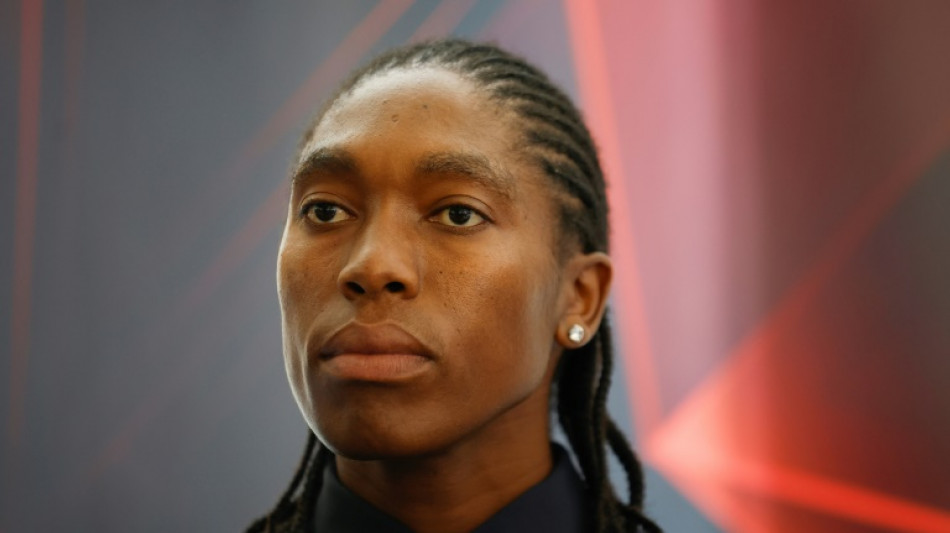
| BP | 1.06% | 34.82 | $ | |
| BCC | 0.13% | 74.63 | $ | |
| SCS | 0.12% | 16.14 | $ | |
| GSK | 0.2% | 49.21 | $ | |
| NGG | 0.26% | 77.65 | $ | |
| RYCEF | -1.83% | 15.28 | $ | |
| RBGPF | 0.42% | 81.05 | $ | |
| BTI | 0.21% | 56.39 | $ | |
| CMSC | -0.04% | 23.06 | $ | |
| VOD | 0.87% | 13.265 | $ | |
| BCE | 0.89% | 23.59 | $ | |
| AZN | 0.17% | 92.68 | $ | |
| RELX | -0.46% | 41.19 | $ | |
| RIO | 0.69% | 80.955 | $ | |
| JRI | 0.32% | 13.523 | $ | |
| CMSD | -0.11% | 23.075 | $ |

Europe court says S.African athlete's trial wasn't fair in gender testing case
A top European court Thursday said a Swiss court did not give double Olympic champion Caster Semenya a fair trial in a much-awaited appeals ruling over contested gender testing.
The European Court of Human Rights' decision comes after a row engulfed the 2024 Paris Olympics over the gender of an Algerian boxing champion.
Semenya, a 34-year-old South African runner, is classed as having "differences in sexual development", but has always been legally identified as female.
She has been unable to compete in her favoured 800m category since 2018, after she refused to take drugs to reduce her testosterone levels under new rules from World Athletics, the governing body for track and field.
Semenya told journalists the ECHR's decision was a "positive outcome".
"We need to respect athletes, we need to put their rights first," said the athlete, who was the Olympic 800m champion in 2012 and 2016 and world gold medallist in 2009, 2011 and 2017.
"It's just a reminder to the leaders to say priorities lie on the protection of athletes."
Semenya has embarked on a long legal marathon to contest the World Athletics rules.
The Lausanne-based Court of Arbitration for Sport ruled against her in 2019 and the decision was validated by the Swiss Federal Court in Lausanne in 2020.
It judged that a testosterone level comparable to that of men gave female athletes "an insurmountable advantage".
The ECHR found that the case had required a "rigorous judicial review that was commensurate with the seriousness of the personal rights at issue", but the Swiss federal court's review had "fallen short of that requirement".
It ruled that, as such, Semenya "had not benefitted from the safeguards provided for" in the European Convention on Human Rights, and ordered Switzerland to pay the athlete 80,000 euros ($93,000) for her expenses.
- 'Fight never over' -
A lower chamber at the ECHR in 2023 ruled that Semenya was the victim of discrimination by the Court of Arbitration for Sport.
Its decision was however largely symbolic as it did not call into question the World Athletics ruling nor allow Semenya to return to competition without taking medication.
Swiss authorities, supported by World Athletics, appealed to the European court's 17-member Grand Chamber, leading to Thursday's ruling.
Semenya had also hoped that the Grand Chamber would uphold that she had been victim of discrimination, but it said those complaints were inadmissible as they did not fall under Switzerland's jurisdiction.
She said on Thursday she would continue to demand dignity and respect for athletes.
"The fight will never be over," she said. "As long as we have injustice, we fight till the court."
There are many types of "differences in sexual development", a group of rare conditions involving genes, hormones and reproductive organs.
Formerly known as intersexuality, they occur in approximately one in 1,000 to 4,500 births.
Semenya was born with the "46 XY" chromosome, rather than the XX chromosome most women have.
Before the 2009 world championships, where Semenya won the 800m gold aged just 18, she was forced to undergo gender testing.
She was subsequently put on medication to reduce testosterone levels.
But Semenya said she felt she was being treated like a "human guinea pig" and vowed to never again allow it.
Testosterone is produced by men and women, but men produce 20 times more of the sex hormone.
But how much the hormone boosts performance remains a matter of debate.
- 'Degrading' -
The International Olympic Committee is weighing reintroducing gender testing.
World Athletics and World Boxing have already adopted chromosomal testing -- generally a cheek swab to check for the SRY gene, which reveals the presence of the Y chromosome.
World Aquatics in 2023 adopted a policy that foresees such testing.
Supporters say such screening simplifies access to women's competition, and UN rapporteur Reem Alsalem has said such tests are "reliable and non-invasive".
But Madeleine Pape, a sociologist of gender in sport, says there is a lack of research proving that transgender athletes or those with one of the many forms of DSD gain a "disproportionate advantage" over XX competitors.
Human Rights Watch has argued that World Athletics regulations "are degrading and invasive of privacy, on grounds that are scientifically contested".
The gender debate reignited in June around Paris Olympic boxing champion Imane Khelif.
Donald Trump, Italian Prime Minister Giorgia Meloni, and Harry Potter author J.K. Rowling were among those who stoked a row over the Algerian's gender.
P.Romano--GdR



